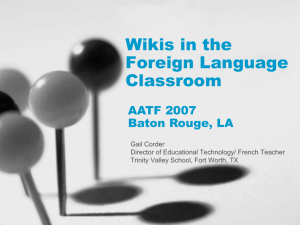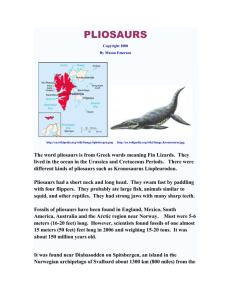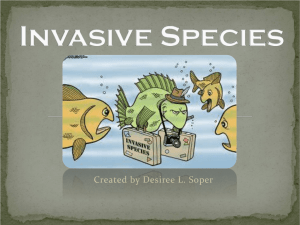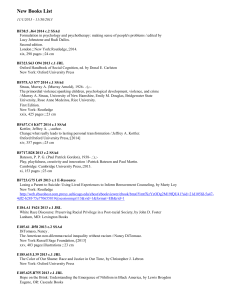WIDE OPEN Implementing a class wiki
advertisement
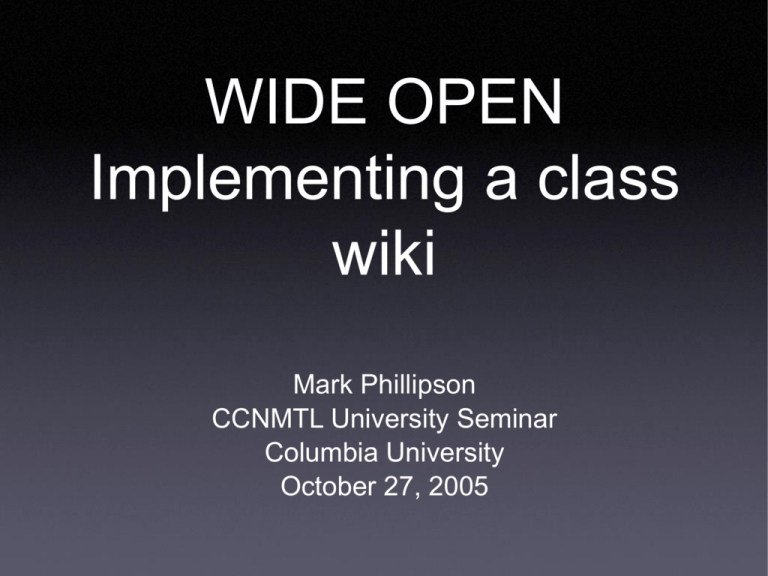
WIDE OPEN Implementing a class wiki Mark Phillipson CCNMTL University Seminar Columbia University October 27, 2005 Wikis and collective authoring Wikipedia’s Alexander Hamilton entry (on 10/14/2005) Wikipedia’s Alexander Hamilton entry (on 10/24/2005) History flow rendering of Wikipedia’s ‘Microsoft’ entry, 11/2001 - 6/2003 History flow rendering of Wikipedia’s ‘Chocolate’ entry, 12/2001-7/2003 History flow rendering of Wikipedia’s ‘Abortion’ entry, 12/2001-6/2003, graphed by saved versions History flow rendering of Wikipedia’s ‘Abortion’ entry, 12/2001-6/2003, graphed by date Everything2 ‘Alexander Hamilton’ page (on 10/14/2005) Breeding ground: Open Source Software movement Various models of OSS development Ward Cunningham, progenitor of wikis A brief taxonomy of pedagogical wikis A student-authored ‘resource’ wiki: Social Justice Movements A student-authored ‘gateway’ wiki: The SaratogaCensus A student-authored ‘simulation’ wiki: The Holocaust Project Student ‘illuminated’ wikis - RAP1 (2003) and RAP2 (2005) Background of the Romanticism Audience Project “Lord Byron Shaking the Dust of England From His Shoes” - Max Beerbohm, 1916 Letters to John Murray 1817 - 1819 Pray when I send you a parcel or packet—do acknowledge it—I care nothing about my letters or your answers—I only want to know, when I have taken trouble about a thing that it has arrived. When parcels that have cost some pains in the composition, & great trouble in the copying are sent to you I should at least be put out of Suspense by the immediate acknowledgement [sic] per return of post….—I am naturally—knowing what continental posts are—anxious to hear that they are arrived…. Don Juan shall be an entire horse or none…. In no way will I have the poem mutilated I will permit no curtailments…. You shan’t make Canticles of my Cantos….. I will have none of your damned cutting and slashing It is serious to me—who am thousands of miles off—& have no opportunity of not proving myself the fool yr. printer makes me—except your pleasure & leisure forsooth. The Gods prosper—& forgive you for I wont [The author] doth kindly trust—with all due deference to those superior persons—the publisher and printer—that they will in future—less misspell—misplace—mistake and mis-everything, the humbled M.S.S. of their humble Servant. Proof of Don Juan Canto I, with marginal jousting between Byron and his London editors Illustration accompanying Mazeppa (1819) “The Finding of Don Juan By Haidee” - Ford Madox Brown, 1873 In times of old, books were as religious oracles; as literature advanced, they next became venerable preceptors; they then descended to the rank of instructive friends; and as their numbers increased, they sunk still lower to that of entertaining companions; and at present they seem degraded into culprits to hold up their hands at the bar of every self- elected, yet not the less peremptory, judge, who chuses to write from humour or interest Samuel Taylor Coleridge, Biographia Literaria, 1817 With an unstable text that can be intruded upon by other author-readers, how do you, caught in the maze, avoid the trivial? How do you duck the garbage? Venerable novelistic values like unity, integrity, coherence, vision, voice, seem to be in danger. Eloquence is being redefined. "Text" has lost its canonical certainty. How does one judge, analyze, write about a work that never reads the same way twice? Sven Birkerts, The Gutenberg Elegies, 1994 The most important characteristics of modern literature, are the extent of surface over which it is diffused, and the number of persons that participate in it. Indeed, if there be such a thing as truth, it must infallibly be struck out by the collision of mind with mind. William Godwin, Political Justice (1793) No self is an island; each exists in a fabric of relations that is now more complex and mobile than ever before … a person is always located at 'nodal points' of specific communication circuits … The truth of (a) statement and the competence of its sender are… subject to the collective approval of a group of persons who are competent on an equal basis. Jean-Francois Lyotard, The Postmodern Condition (1984) Romanticism seminar website, UC Berkeley, 2000 Envisioning RAP Comparing Wikis in 2002 RAP demo Live page at http://ssad.bowdoin.edu: 8668/space/Wide+Open+demo Two generations of RAP students mark up Clare’s “I Am” The Romantic Audience Project RAP 1 (2003): http://ssad.bowdoin.edu:8668/ RAP 2 (2005): http://ssad.bowdoin.edu:9780/snipsnap/eng242s05/space/start Talk demo: http://ssad.bowdoin.edu:8668/space/Wide+Open+demo References Behrent, Steven C. "The Romantic Reader." A Companion to Romanticism. Ed. Duncan Wu. Cambr idge, MA: Blackwell, 1997. 91-100. Birkerts, Sven. The Gutenberg Elegies : The Fate of Reading in an Electronic Age. Boston: Faber, 1994. Guzdial, M., et. al. "When Collaboration DoesnХt Work. " 2002. Available: http://coweb.cc.gatech.edu:8888/csl/uploads/24/CMCI-ICLSfinal.pdf. July 7 2004. Klancher, Jon P. The Making of English Reading Audiences, 1790-1832. Madison: U of Wisconsin P, 1986. Lyotard, Jean Francois. The Postmodern Condition : A Report on Knowledge. Theory and History of Literature. Vol. 10. Minneapolis: U of Minnesota P, 1984, 1984. McHenry, Robert. "The Faith-Based Encyclopedia." 2004. Available: http://www.techcentralstation.com/111504A.html. October 5 2005. Nakakoji, K, et. al. ТEvolution Patterns of Open-Source Software Systems and Commu nities.У2002. Available: http://www.kid.rcast.utokyo.ac.jp/%7Ekumi yo/mypapers/IWPSE2002.pdf. October 2 2005. Newlyn, Lucy. Reading, Writing, and Romanticism : The Anxiety of Reception. New York: Oxford UP, 2000. Phillipson, Mark, and Hamilton, David. "The Romantic Audience Project: A Wiki Experiment." 2004. Romantic Circles. Available: http://www.rc.umd.edu/pedagogies/common s/innovations/ra p/index.htm. Oct. 2 2005. ViЋgas, Fernanda B., Wattenberg, Martin, and Dave, Kushal. "Studying Cooperation and Conflict between Authors with History Flow Visualizations." 2004. Available: http://portal.acm.org/ft_gateway.cfm?id=985765&type=pdf&c oll=GUIDE&dl=GUIDE&CFID=59226987&CFTOKE N=87355 038. September 20, 2005.


